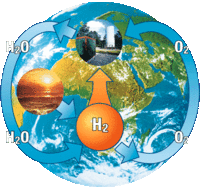Following is the essay you can designate as Volume 10, Number 23 of
This Week’s Clue, based on the e-mail newsletter I have produced since
March, 1997. It would be the issue of June 4.
Enjoy.
The War Against Oil, unlike the Iraq Conflict or The War on Terror, really is a generation-long operation. (Picture from the GKSS Research Center in Germany.)
That’s because of how I define "victory":
Carbon and hydrocarbons are completely replaced by hydrogen.
There are two reasons for this, and only one has to do with energy:
- The only hope to start reversing global warming (which is what we have to do) is to eliminate carbon entirely from our energy diet.
- The only way to solve the world’s water woes is with hydrogen energy.
(Picture from the Watersecrets blog.)
Hydrogen is the fuel used in fuel cells (and rocket engines). The
general formula is that hydrogen and oxygen are combined, under
controlled conditions, releasing energy and a single waste product,
water. Pure H2O. The more people in a particular place, the more energy
that is used, the more water you create in that particular place. Capture it, filter it, use it.
Oil is not what the world is shortest of right now. Water is. We
have a rising tide of salt water, from global warming, and a crying
need for fresh water, all over the world. I see nothing wrong with
producing hydrogen from salt water — you just circulate your source
regularly and clean the tanks once in a while. All you then need do is
build systems for delivering this hydrogen to the market. Pipelines can
work. Balloons can work. And if you convert the hydrogen into ammonia
— NH3 — at the source, you can run it through the same pipes you’re
now running oil. Nitrogen, not oxygen, is the most common gas in our atmosphere. You say you have a problem cleaning those pipes,
ducky? Ammonia is a great cleaner.
The point is that the hydrogen cycle has absolutely enormous
benefits, which go beyond the immediate problem of creating new energy.
All the materials in that cycle are in plentiful supply — energy from
the Sun, from the wind, from the Earth. Water from the seas. Nitrogen
from the air.
Where do I see ethanol in all this? Mainly as a way-station. But the production of cellulosic ethanol
can be of benefit. It creates an incentive for producing vast
quantities of fast-growing biomass. And what process produces biomass,
you ask? Plants take in carbon dioxide, and emit oxygen. That’s right
kids. Plants are constantly striving to reduce the percentage of carbon
dioxide, the leading gas contributing to global warming, from our
atmosphere. Deforestation, which reduces the amount of plant life on
the planet, also reduces the amount of photosynthesis.
So let’s grow the fastest-growing things we can grow, under
controlled conditions, and use the resulting biomass to produce alcohol
as a short-term solution to our energy problems. It couldn’t hoit.
There is a danger here, of course. That is, the political equation.
Right now we’re seeing advocates of cellulosic ethanol trying to push politically favored crops as the feedstock — pine trees for instance. This
is very, very stupid. We need pine trees for toilet paper — we can’t
all use Toto toilets.
This is a choice which must be made scientifically, and the answer
is going to be different in different places around the globe. You
start with local plants, you grow them in greenhouses, you measure them
in terms of their efficiency in producing biomass, and the speed with
which they produce it, and their hardiness, and the fertilizer needed to keep them growing, and their drought tolerance. Then you go into production.
Frankly, I suspect the real problem is politicians will learn pot may be the answer.
So here’s the strategy:
- Set a price floor which guarantees alternatives a market.
- Research the best scientific choices for cellulosic ethanol biomass.
- Once production is adequate, and the energy market starts to
stabilize, guarantee hydrogen a price advantage, crowding hydrocarbons
out of the market.
Easily said. Not easily done. We are at least 30 years behind the
curve on all of this. There are trillions of dollars that have to go
into this, money which will be wasted unless we’re all watchful, and
insist that this be treated as a national emergency, in which crooks
are committing treason.
I’ve said it before and I’ll say it before, this is a war everyone can
win. It’s a war everyone, everywhere in the world, should become
engaged in. I do expect that folks in places which currently produce
lots of oil and natural gas will be upset as these solutions begin to
crimp their markets. Tough.
But that’s the first thing that is going to happen — places like
the Middle East, Soviet Central Asia, Indonesia, West Africa, and
Venezuela are going to start hurting, as the value of their production
declines. Is that really so terrible? When Vladimir Putin no longer
has the money to oppress his people, when Hugo Chavez no longer has the
money to ignore democracy, when Saudi Arabia no longer has the money to
ignore human rights — this is a problem we want to have, a problem we
will still need to manage but a problem we want to have.
Such a day is at least a decade off, from the time we really become
focused on the task. We need to be united in this. The elements of
victory are:
- Science and engineering.
- Entrepreneurship.
- Vigilance and public support.
Can we do it?
You bet we can. But I know, and you must know, that this is a
journey of 1,000 miles, and that we’re still some way in time from
taking the first tentative steps.















